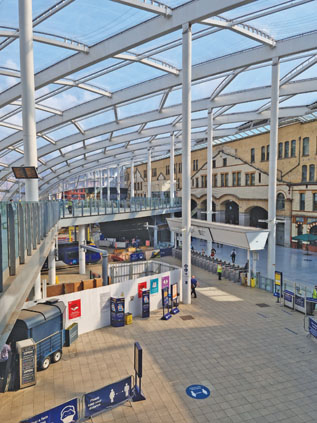IT systems for sending documents between the Security Service MI5 and counter-terror police were so ‘clunky’ that a PowerPoint document had to be sent one slide at a time, the Manchester Arena Inquiry has heard.
This came out during 55 paragraphs of ‘gisted’ testimony that the Inquiry counsel Paul Greany read out to the Inquiry’s day 194 session in Manchester yesterday.
A key role of an MI5 investigator, the Inquiry heard, is ‘to pull together intelligence from different sources and to be able to take an overview based on all relevant available information. MI5 has computer systems which allows an investigator , upon the receipt of new information, to look at the whole picture of what is known to MI5 about the subject of that information. Investigators can be hungry for investigation and would always rather see more and know more about relevant intelligence which is being received. However, there are significant risks caused by having too much information, which could impede the ability of investigators effectively to triage intelligence and make effective prioritisation decisions, and too little information’
The system in place in 2014 to 2017 – that is, before the Manchester Arena suicide bombing of May 22, 2017 – for triaging new information, which did not come within an existing priority operation, was not as effective as it might have been, said a witness.
In April 2017 the north−west investigative team went into amber on its workload dashboard. This meant ‘that it was in a period of stress and high capacity, which indicated that there should be some redistribution of work to other teams around the UK’.
Certain MI5 and CTP (counter terror policing) officers carrying out the same type of work as one another were intentionally co−located in a single room so as to facilitate ready access to one another. Witnesses from CTP and MI5 described ‘certain IT systems for one aspect of the partnership between them as ”clunky” and ”hit and miss”’. One of the MI5 witnesses described sending information to CTP for intelligence purposes on a different system as, as he put it, ”bureaucratic and process heavy”.
A senior MI5 witness gave evidence that electronic files would not send properly if the file size was too large such that, for example, PowerPoint presentations may have to be sent slide by slide. This was, the Inquiry heard, ‘onerous’ for investigators, who were regularly writing and sending messages from MI5 to the police. ‘These problems improved over the years and decades leading up to 2017, but it was familiar to the witness that in the years up to 2017 documents might be sent and it might not be realised for a day that the documents had not arrived. This contrasted with police forces being ‘very good at talking to each other and sharing information, including out of hours’.
A clue to local work of counter-terrorism included mention of a 2010 JTAC report on the Muslim community in Manchester. It noted concerns about risks arising within the Libyan South Manchester community, amongst others, and a specific risk that the younger generation may become more attracted to Al−Qaeda−influenced global extremism as they lost the nationalist focus of their parents.
After the murder of Fusilier Lee Rigby in 2013, there was more focus by MI5 on lone actors. MI5’s Behavioural Science Unit had input on the assessment of existing subjects of interest to determine whether they had the potential to be lone actors.
Before 2017 MI5’s assessment was that there was nothing about the risk in Manchester which was out of step with other areas of the UK outside of London. There was therefore no particular reason for police officers to deliver messages to large venues in the north−west to say that events were at particular threat of being targeted. It was the same risk across the country.
Libya was one of the top four priorities for Counter−terrorism Policing in 2017 to 2018. The other priorities were Syria, online radicalisation and vulnerability arising from mental health. In late 2016, Counter−terrorism Policing did a piece of analysis of travellers from Manchester to Libya over three months, ‘looking at fighting age boys and men aged 16 to 30 years. The outcome was that 14 there were 544’.
More generally, the ‘gist’ of the evidence given in closed session gives an insight into how CT officers are making judgements on suspects’ ‘mindsets’ – what a supporter of Islamic State would do, if anything, in actions to support IS’ aims of a caliphate.
As one MI5 witness put it (during two days in the witness box in open session ‘ answering all the questions asked of him to the limit of his ability without harming national security’, the Inquiry heard): ‘It is acceptable for different investigators to arrive at different judgements.’
Background
Mr Greany was a virtual speaker from Manchester among the speakers at the October 2021 Consec, the annual conference of the Association of Security Consultants, at Twickenham. He covered the first volume of a projected three of findings from the Inquiry chairman Sir John Saunders, which covered the security around the Arena; and featured in the July 2021 print edition of Professional Security magazine. The other volumes are due to cover the emergency response; and the suicide bomber and his radicalisation.
You can read the transcript at the Manchester Arena Inquiry website: https://manchesterarenainquiry.org.uk/transcripts-by-hearing-date/.
The Inquiry most recently featured in the February print edition of Professional Security; the January material presented to the Inquiry by contract event stewarding contractor Showsec, the Security Industry Authority (SIA), the Home Office, police and the Arena operator SMG Europe on their work arising from findings of the Inquiry so far; which began in September 2020.
Photo by Mark Rowe; Manchester Victoria rail station next door to the Arena.










